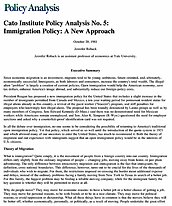President Reagan has proposed a new immigration policy for the United States that includes a slight increase in the number of immigrants permitted from Canada and Mexico, a ten-year waiting period for permanent resident status for illegal aliens already in this country, a revival of the guest worker (“bracero”) program, and stiff penalties for employers who knowingly hire illegal aliens. The proposal has been roundly denounced by Latino groups as well as by many members of Congress. Sen. Edward Kennedy (D‑Mass.) said there was no demonstrated need for Mexican workers while Americans remain unemployed, and Sen. Alan K. Simpson (R‑Wyo.) questioned the need for employer sanctions and asked why a counterfeit-proof identification card was not required.
In all the debate over immigration, no one seems to be considering the possibility of returning to America’s traditional open immigration policy. Yet that policy, which served us so well until the introduction of the quota system in 1921 and which allowed many of our ancestors to enter the United States, has much to recommend it. Both the theory of migration and our experience with immigrants suggest that an open immigration policy would be in the interests of U.S. citizens.

